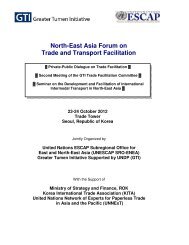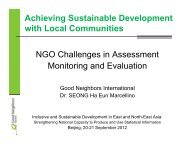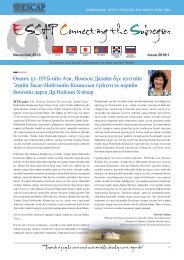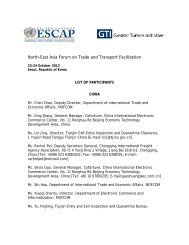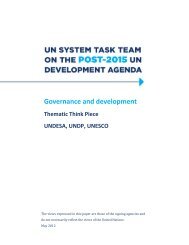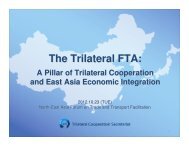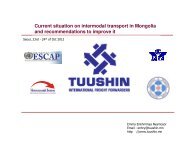Full Report - Subregional Office for East and North-East Asia - escap
Full Report - Subregional Office for East and North-East Asia - escap
Full Report - Subregional Office for East and North-East Asia - escap
Create successful ePaper yourself
Turn your PDF publications into a flip-book with our unique Google optimized e-Paper software.
EXECUTIVE SUMMARY<br />
FORWARD-LOOKING MACROECONOMIC POLICIES FOR INCLUSIVE AND SUSTAINABLE<br />
DEVELOPMENT<br />
Economic growth in the developing countries of <strong>Asia</strong> <strong>and</strong> the Pacific slowed to 5.6% in 2012 as a result<br />
of the double-dip recession in the euro zone <strong>and</strong> the tepid recovery of the U.S. economy. Although<br />
growth is projected to inch up to 6% in 2013, this rate is still below the average of 7.8% achieved in<br />
2010-2011 <strong>and</strong> the average of 8.6% observed during the pre-crisis period of 2002-2007. More importantly,<br />
the extent to which the region’s economic growth is contributing to the achievement of key development<br />
goals remains unclear.<br />
Despite a significant reduction in poverty, the region is still home to more than 800 million poor struggling<br />
to survive on an income of less than $1.25-a-day. This figure represents nearly two-thirds of the world’s<br />
poor. Notably, in many countries in the region, including the most populous ones, rapid growth in income<br />
since the 1990s has been accompanied by increases in income inequality. In addition, the high resourceintensity<br />
of economic growth has spurred a rapid rise in emissions of greenhouse gases <strong>and</strong> made<br />
countries increasingly vulnerable to commodity price shocks, while key natural resources, such as <strong>for</strong>est<br />
covers, fisheries <strong>and</strong> fresh water, have been overexploited.<br />
Economic insecurity has also risen amid rapid growth. More than 1 billion workers in the region are in<br />
vulnerable employment – characterized by low wages, no benefits, no job security <strong>and</strong> difficult conditions<br />
of work that undermine workers’ fundamental rights. More than 900 million people in the region live just<br />
at the edge of extreme poverty on an income of between $1.25-a-day <strong>and</strong> $2-a-day, with the risk of a<br />
small shock or personal mis<strong>for</strong>tune pushing them into extreme poverty in the absence of a comprehensive<br />
social protection floor.<br />
Food security is also a major problem in <strong>Asia</strong> <strong>and</strong> the Pacific, with an estimated 563 million people<br />
undernourished. Economic insecurity <strong>and</strong> vulnerability are exacerbated by increasingly damaging natural<br />
disasters, which many believe are related to climate change <strong>and</strong> environmental degradation. Notably, during<br />
the period 1970-2010, the average number of people exposed to yearly flooding in <strong>Asia</strong> more than doubled<br />
from 29.5 million to 63.8 million while the population residing in cyclone-prone areas increased from 71.8<br />
million to 120.7 million. In sum, despite the region’s rapid economic growth, hundreds of millions of people<br />
continue to be highly vulnerable <strong>and</strong> insecure. Economic expansion has not been inclusive enough <strong>and</strong><br />
has not translated into increased security of jobs <strong>and</strong> livelihoods. Instead, growth has been mostly jobless,<br />
that is without a commensurate growth of decent <strong>and</strong> productive employment in the <strong>for</strong>mal sector. As<br />
a result, livelihood insecurity <strong>and</strong> disparities of opportunities <strong>and</strong> outcomes, including income, assets <strong>and</strong><br />
wealth, are on the rise <strong>and</strong> rein<strong>for</strong>cing one another.<br />
vii



